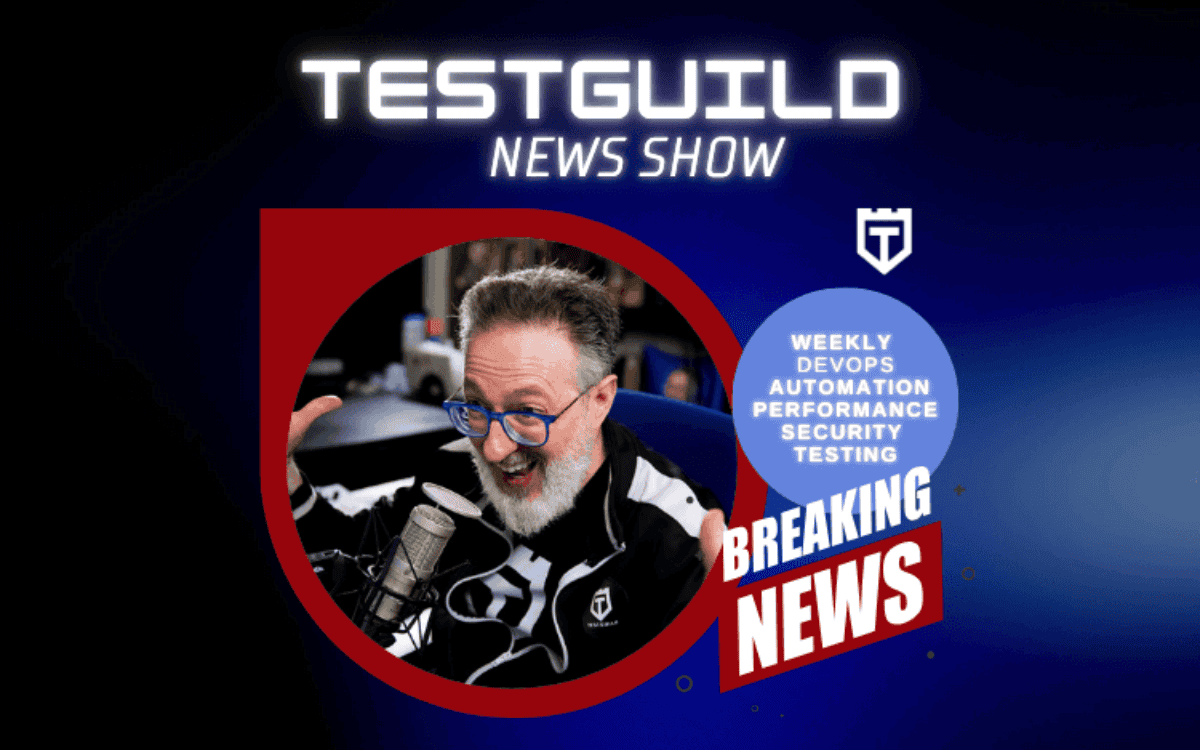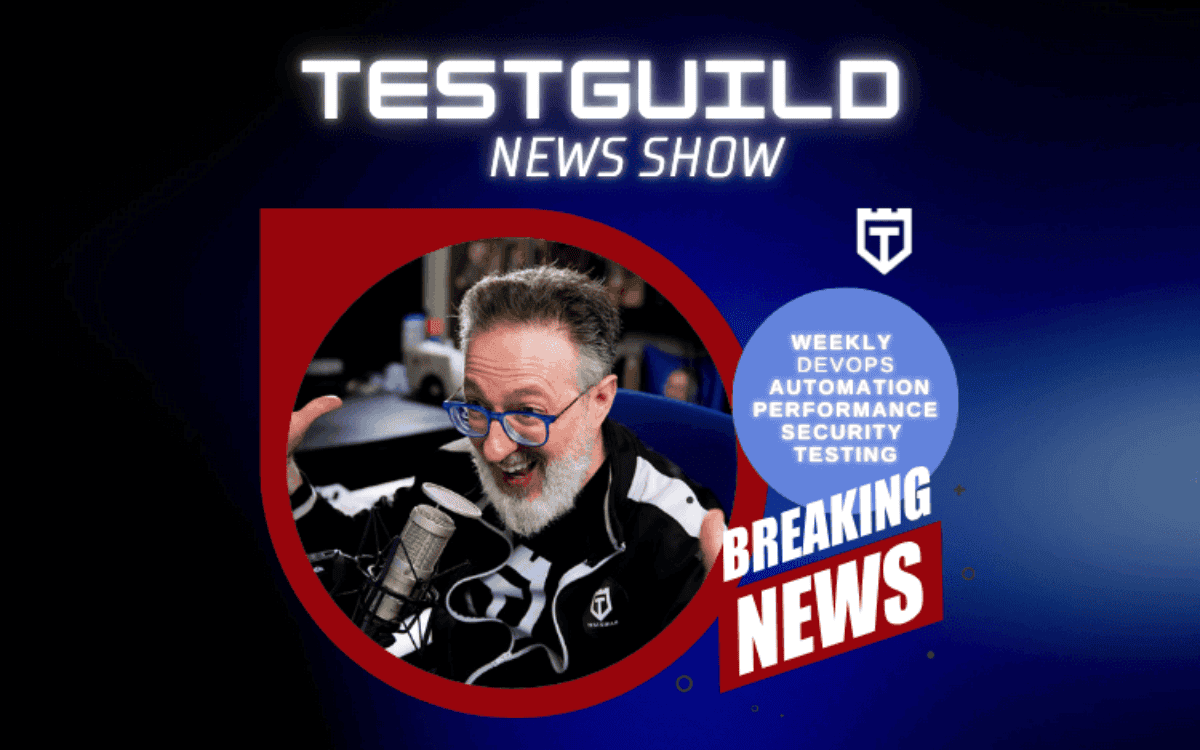About This Episode:
What does poker have to do with software testing?
Have you seen the new open-source Playwright Studio framework?
How can you use AI to help with Fintech testing?
Find out in this episode of the Test Guild New Shows for the week of Aug25. So, grab your favorite cup of coffee or tea, and let's do this.
Exclusive Sponsor
This episode of the TestGuild News Show is sponsored by the folks at Applitools. Applitools is a next-generation test automation platform powered by Visual AI. Increase quality, accelerate delivery and reduce cost with the world’s most intelligent test automation platform. Seeing is believing, so create your free account now!
Applitools Free Account https://rcl.ink/xroZw
Links to News Mentioned in this Episode
| Time | News Title | Link |
| 0:16 | Register for Newsshow | https://testguild.me/newsub |
| 0:26 | Poker Software tTesting | https://testguild.me/hz1znw |
| 1:52 | Selenium Grid | https://testguild.me/4mpmwi |
| 2:45 | Playwright Studio | https://testguild.me/jurp2u |
| 3:23 | Kane AI | https://testguild.me/6qnwf8 |
| 4:36 | AI in Fintech Testing | https://testguild.me/fintech |
| 5:20 | Opkey $$ | https://testguild.me/0s8nyk |
| 6:24 | QA Product Management | https://testguild.me/9adzrl |
| 7:32 | Artillery | https://testguild.me/1sgqjz |
| 8:21 | Kubiya $$ | https://testguild.me/bdlfxj |
| 9:15 | Kubiya Podcast Interview | https://testguild.com/p115 |
News
[00:00:00] Joe Colantonio What does poker have to do with software testing? Have you seen the new open-source Playwright Studio framework? And how can AI help you with Fintech Testing? Find out in this episode of the Test Guild News Show for the week of August 25th. So grab your favorite cup of coffee or tea and let's do this.
[00:00:16] Joe Colantonio Before we get into it. If you haven't already, please make sure to subscribe to our Test Guild LinkedIn News Show newsletter that I'll have a link for down below to never miss another episode.
[00:00:26] Joe Colantonio All right, first up is all about poker and software testing, and I found this post on LinkedIn from Scott, who pointed to this study by Richard Bender. So a recent analysis compared three major approaches to requirement based software testing. First one is Path coverage through models. Second is pairwise testing and the third is cause effect graphing. And this study evaluates these methods based on criteria such as ambiguous elimination based on logical consistency verification and defect observability. And the research finds that cause effect graphing emerges as the most effective and efficient method, and this approach, adopted from hardware testing techniques, focuses on the observability of defects and produces a smaller set of tests with higher coverage compared to other methods. And the cause effect graph addresses key challenges in software testing, including poor requirement quality and possibility of exhaustive testing and the need to propagate defects to observable points, and the method also approves beneficial for agile development projects supporting techniques like acceptance testing driven development. In contrast, path coverage and pairwise testing methods show limitations in areas such as handling ambiguities, identifying implicit requirements, and ensuring defect observability. So if you're a tester and you haven't heard or tried cause effect graphing before, here's a chance to read more about it and try it for yourself. Let me know your thoughts in the comments down below.
[00:01:52] Joe Colantonio If you use Selenium Grid you want to listen to this next announcement. Selenium just announced the introduction of a multi architecture Docker images for Selenium Grid. And the post goes over how this update enables wider capabilities and efficient testing process across different hardware architectures, including ARM and x86. And it also talks about how simplicity and accessibility are driving forces behind this enhancement, and teams using various hardware architectures can now streamline the testing workflows without compatibility issues. And by leveraging Docker's containerization, Selenium ensures that the diverse systems can maintain consistent testing environments, and many testers are excited about this feature since it helps to make cross-platform testing more seamless than ever. So if you are using Selenium Grid, you can find a link for that down below.
[00:02:39] Have you seen or heard of Playwright Studio? No? Let's check it out. So Ashish, just let me know that ING has officially open source its in-house automation testing framework. INGenious about four years of development went into it, and this framework integrates multiple open-source libraries and is designed to enhance business assurance testing, covering everything from browser and API testing to database and file validations. And by open sourcing and INGenious, ING aims to foster collaboration within the quality assurance community. And the company invites the community to contribute to improve the framework. I highly recommend you check it out. It was built with the goal of bringing business users closer to engineers, and I love your thoughts and you can find the link for it in the comments down below.
[00:03:23] Joe Colantonio This next post is all about AI in testing. It was post by Asad by actually had the opening welcome session at TestMu last week and found out that Lambda test has introduced Kane, which is a new AI powered assistant which is designed to help you make your testing more efficient and accurate. I mean, it's being called the first AI software testing agent, but I've had a few similar tools on the show. But anyway, so the introduction of Kane aims to streamline the testing process by leveraging artificial intelligence to identify and resolve potential bugs and issues faster than what they call traditional methods. And this advancement promises to deliver more reliable results, enable developers and testers to maintain higher standards of quality in their software products. And the link talks about how Kane utilize machine learning algorithms to analyze historical testing data, predict potential problem areas, and suggest areas of improvement. And by doing so, it reduces the amount of manual effort required by software testers and helps shorten the testing cycle. And this integration of AI and software testing is expected to lead to faster release cycles and increase productivity within development teams. What do you think? Check it out in the links down below and let me know your thoughts.
[00:04:36] Joe Colantonio Speaking of AI, you don't want to miss this webinar. I'm running tomorrow all about AI testing in Fintech and beyond. This happens tomorrow, August 20th summit. But don't worry if you miss it, you can still register for instant replay if you missed it using the link down below, but I really would love you to join us live for a live demo tomorrow, where the AI capabilities in the Fintech testing will be showcased. We're going to go over AI in Fintech. We're going to integrating AI in development cycles, we're going to how it can help transform business impact by using insights and how AI driven testing can elevate the ROI and competitive advantage of your financial fintech software releases and a whole bunch more, you don't want to miss it. Register below. Hope to see you there!
[00:05:20] Joe Colantonio Next up is a Follow the Money segment. I just learned that Opkey, which is a company that specializes in AI based ERP testing, has secured 47 million and series C round funding. And the CEO, Pankaj who's been on our podcasts in our Guild’s conferences before, highlights that the funding will be utilized to enhance the platform's capabilities, expanding the engineering team and accelerating global marketing reach. And I think software testers should take note the rise of AI testing platforms such as Opkey, really signifies a growth trend towards automation in ERP testing, and this trend offers the potential to significantly reduce manual testing efforts and enhance overall test accuracy for these larger package-based applications. Any time I see an investment, this large and strong technology is just a signal to me that, hey, maybe this is something we should look at, AI being leverage for these types of solutions. If you're testing any type of ERP system, definitely a solution or try to see other solutions that use AI to see how they can help you do better automation as well.
[00:06:24] Joe Colantonio This next post is all about enhancing quality and product management. And this is by Millan, who post in his recent blog post all about the critical role that quality assurance plays in the product development lifecycle. And in this post, he points out that product failures can be drastically reduced by integrating comprehensive QA processes from the very beginning and by advocating for a collaborative approach. He underscores the benefits of evolving QA teams earlier in the development process to catch potential issues before the escalate. Millan also outlines several strategies for improving product quality. This includes advocating for cultures of continuous quality improvement, adopting agile methodologies, and leveraging automation tools to streamline repetitive task. Additionally, he stresses the importance of fostering clear communication channels among the product managers development and QA teams to ensure alignment and shared understanding of quality goals. I highly encourage testers to work closely with development and product development teams to ensure their insights a factored into the decision-making process, something I've seen lacking in many organizations. Thank you, Millan for this article. And you can find out more about it in the comments down below.
[00:07:32] Joe Colantonio And in Performance testing news, Artillery has made another release, version 2.0.20, and with this latest version, it brings a lot of different enhancements and fixes that are aimed to improve Load testing workflows. The Artillery team has implemented performance improvements across the system, especially focusing on better support for AWS Lambda and Http request. And according to the release notes by Hassy, the release introduces asynchronous Http request support for more efficient performance and resource usage. Additionally, various bug fixes have been addressed to enhance stability and reliability in load testing scenarios, and users will probably also notice more better updated documentation aimed at making the tool easy to use and more accessible to new users.
[00:08:17] Joe Colantonio And last up is the follow the money segment in the DevOps space. So this is Kubiya. So I'm always excited to see how companies have grown since I've interviewed them on my podcast. Kubiya is one of them. I introduced them around last year. They're a startup in the DevOps domain with an AI powered chatbot assistant, which has announced successfully securing 6 million in seed funding. And this fresh capital will help Kubiya launch its innovative AI platform broadly into the market. The Kubiya platform aims to streamline DevOps operations by enabling engineers to interact with infrastructure and operations via a conversational assistant, allowing seamless communication and execution of operations. And the AI assistant, designed to simplify traditional DevOps workflows, can automate routine tasks, mitigate the need for substantial human intervention. And the platform, promises to lower the barrier for entry into the DevOps field, making it more accessible to smaller teams without extensive resources.
[00:09:15] Joe Colantonio And to learn more about Kubiya and Generative AI in DevOps, definitely check out my podcast interview with Shani, last year that takes a deeper dive into this feature and a whole bunch more, and you can find all the links for this in the comments down below.
[00:09:29] Joe Colantonio And for links of everything of value we covered in this news episode, head on over to the links in the comment down below. So that's it for this episode of the Test Guild News Show. I'm Joe, my mission is to help you succeed in creating end-to-end full stack pipeline automation awesomeness. As always, test everything and keep the good. Cheers.
Sign up to receive email updates
Enter your name and email address below and I'll send you periodic updates about the podcast.




